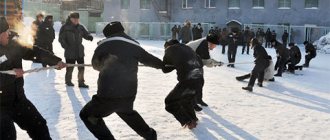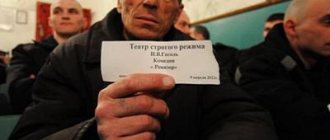The criminal legislation of Russia, like many other democratic countries of the world, differentiates the degree of responsibility of adult and juvenile offenders. Thus, it is believed that minors, who are, in fact, children who committed a crime, cannot fully assess the degree of social danger of their crime. In addition, one cannot fail to take into account that children are significantly influenced by their environment and upbringing.
In this regard, the courts, when deciding on the application of one or another measure of punishment in relation to juvenile offenders, proceed from the principles of humanity, therefore they are relatively rarely sentenced to real terms in prison. However, due to the social danger of certain criminal acts, isolation from society is a necessary condition for the correction of a minor. In these cases, children are sent to juvenile correctional facilities based on a court verdict.
What is an educational institution for minors?
A correctional colony is a specialized institution of the penitentiary system of the Russian Federation , where minors who have committed a particular crime serve their sentences.
As its name suggests, the main emphasis in educational colonies is not on punishing criminals, but on their correction, adaptation to life without a criminal component in the future, after release.
Free legal consultation
+8 800 100-61-94
However, in practice, situations on the ground can hardly be called conducive to correction. Adolescent prisoners have a greater degree of freedom in the penitentiary than adults in correctional colonies. In this regard, in many of them there reign rather “wild” informal orders associated with the functioning of a certain hierarchy among prisoners.
The FSIN, being a rather closed organization, rarely makes public what is happening in the institutions under its jurisdiction. However, the evidence of persons serving sentences in educational colonies gives reason to assume that violations of the rights and freedoms of minors occur en masse in these institutions.
However, in fairness, it should be noted that the situation in different children's colonies for minors can differ significantly for the better or for the worse , which indicates the fundamentally important role of the administration of the institution in the educational and correctional process.
According to open information from the Federal Penitentiary Service, at the end of 2022, 21 educational colonies were operating in our country. As a result, they are not located in every region, which creates a certain problem due to the fact that a number of prisoners are serving their sentences quite far from home.
As of November 1, 2022, 905 people were serving sentences in these children's prisons.
Attention! Until 1997, VKs were called educational labor colonies (ETK), and tens of thousands of people were among the prisoners.
Year after year there is a trend towards a decrease in the number of juvenile prisoners. Moreover, this is not due to a general decrease in the number of crimes committed by children, but to the emerging law enforcement practice aimed at imposing the smallest possible number of sentences on minors that would involve actual imprisonment. It should be noted that the overwhelming number of crimes committed by children in recent years are related to illegal drug trafficking.
Features and difficulties
It is worth noting that, in accordance with Article 139 of the Penal Code of the Russian Federation, a person who, at the time of reaching adulthood, has not fully served the prescribed term of imprisonment, may remain within the walls of an educational colony, but maximum until he reaches 19 years of age (previously it was up to 21 years of age) . Otherwise, immediately upon reaching the age of 18, the prisoner is sent to an adult correctional facility specific to the crime he committed. This principle is based on the fundamental function that was mentioned at the beginning of the article and is aimed at consolidating the results obtained in the upbringing and social adaptation of an adult.
The reduction of the maximum permissible age from 21 to 19 years was met with hostility by many lawyers. This is due to the fact that, along with age, the motivation of juvenile delinquents has also been reduced, since in cases where a teenager at the age of 16 is sentenced, for example, to five years in prison, then in almost any case he will end up in an adult prison with real “criminals” . And this circumstance can put an end to the minor’s desire to improve and adapt to society, since, in fact, he will be forced to adapt to the new conditions of detention in an adult colony, which can also neutralize all attempts to re-educate him and instill appropriate values. Therefore, the question so often arises about the appropriateness of the changes mentioned above.
The second question that relatives of the inmates of the institutions in question often ask themselves, since juvenile delinquents are not always orphans or those who have become “conditional orphans” with living parents, is the desire to find out what they feed in educational colonies and enough Is this for the normal functioning and healthy growth of a minor. Even without the latest changes dating back to 2016 and aimed at a complete revision of the diet for prisoners in correctional institutions, the category of minors in question always ate sufficiently and, in the opinion of many, their diet was much better than in orphanages. And since the entry into force of FSIN Order No. 696 of September 2, 2016, the nutrition system in all penitentiary institutions has received significant improvements, which, subject to compliance with these innovations, should once and for all remove the issue of malnutrition among juvenile prisoners from the agenda.
Why do children end up in VK?
As noted above, today the position of the courts is to minimize the number of sentences that would involve imprisonment. Thus, in the overwhelming majority of cases, minors completely avoid criminal liability thanks to the introduced institution of educational measures. In other cases, children may be sentenced to probation, a fine, or other penalties.
However, certain criminal acts do not allow the perpetrator to be free. These include:
- murder;
- causing serious harm to health;
- crimes against sexual integrity;
- terrorism;
- organization of extremist communities;
- robbery;
- organization of a criminal community;
- sale of narcotic substances in large and especially large quantities.
It should be noted that when deciding whether to impose a particular type of punishment, the court is guided by many factors in addition to the gravity of the act committed, including, among other things, age, personality and upbringing of the defendant, etc.
Features of institutions for girls
The law does not provide for any differences in the regime of detention in educational prisons for minors. In fact, the conditions of detention are the same for both girls and boys. However, there are some differences in the terms associated with the transfer to one or another mode of serving a sentence.
For example, all convicted girls, even if they previously served a sentence, are transferred to a light regime after serving 3 months of their sentence , if they have no penalties. Previously convicted male teenagers can be transferred to a light regime only after serving at least 6 months of their sentence.
Reference! Mixed detention of prisoners of different sexes in educational colonies is not allowed.
Considering the fact that, according to statistics, underage girls are less prone to illegal behavior, in fact there are significantly fewer colonies for them than for male teenagers. The largest and most famous of them is located in the city of Bryansk.
Minors sentenced to imprisonment as an object of penitentiary research
The need to single out this social stratum for independent penitentiary research is caused by the following reasons.
Firstly, the importance and scale of tasks to protect the health and life of the younger generation, and consequently, the formation of state policy to protect the rights and legitimate interests of children and adolescents.
Secondly, the peculiarities of correction and correction of the behavior of juvenile criminals, due to the specifics of their upbringing and life activities (relatively limited period of personality formation, variability of social positions, limited legal capacity, etc.), characteristics of personal, social-group, psychological and other characteristics.
Thirdly, the high criminal activity of adolescents is closely related to these characteristics.
At the same time, the most important thing for identifying juvenile offenders as an independent object of study is that the penitentiary characteristics of this category are the very formula of the law, which in certain chapters of the Criminal Code of the Russian Federation and the Penal Code of the Russian Federation established the features of criminal liability and punishment of persons of this contingent, established age criteria for separating it into a special demographic group of criminals, as well as the procedure for serving and releasing punishment. Moreover, if we take into account that its lower age limits - 14 years and upper - 18 years are associated with the requirements of developmental psychology and criminal policy, then it becomes clear how significant the difficulties are in studying juvenile delinquency, the personality of the criminal, and developing measures for this age group of persons prevention and criminal legal response.
Persons who commit illegal acts at an early age, later, as a rule, are much more difficult to correct and ultimately constitute the main reserve for adult and recidivism. At the same time, the aggravation of the problem of family dysfunction against the general background of poverty and constant need, the moral and social degradation occurring in families, lead to negative consequences. Basically, in these families, drunkenness, drug abuse, promiscuity in sexual relations flourish, and there are no moral principles or basic culture. As a result, there is a rapid increase in extremely dangerous violent crimes committed by teenagers and even children.
It must be stated that juvenile delinquents determine the moral level and appearance of society, its development and social maturity.
If we consider only the penitentiary aspect, it should be noted that, ensuring that minors serve a sentence of imprisonment separately from adult convicts, the legislator proceeds from the following principles of the penal legislation of the Russian Federation:
- differentiation and individualization of execution (serving) of punishment;
- rational use of coercive measures, means of correction and stimulation of law-abiding behavior;
- combining punishment with corrective action.
This refers, first of all, to the separate detention of juvenile convicts, who, as a rule, have much less criminal experience than adult convicts, which can have a negative impact on them.
In this regard, certain legislative provisions play an extremely important role, which provide for different procedures and conditions of detention of persons serving sentences in educational colonies.
Educational colonies are a type of correctional institutions designed to hold minors sentenced to imprisonment.
In the system of correctional institutions, educational colonies occupy a special place, since the main factor determining the conditions for serving sentences in these colonies is the minority of offenders, which, on the one hand, requires more preferential conditions of detention compared to adult criminals, and on the other hand, opens up wide educational opportunities. - pedagogical opportunities for the return of convicted minors to a law-abiding working lifestyle in society and the moral character of a person and citizen.
According to Art. 88 of the Criminal Code of the Russian Federation and Art. 74 of the Penal Code of the Russian Federation, imprisonment is imposed on minors for a term of not more than 10 years and they serve it in educational colonies. Convicts may also be kept in educational colonies until they reach the age of 19.
At the same time, isolated sections may be created in educational colonies, functioning as general regime correctional colonies, for the detention of convicts who have reached the age of 18 while serving their sentence. The procedure for creating these areas is determined by the federal executive body that carries out the functions of developing and implementing state policy and legal regulation in the field of execution of criminal penalties.
Let's look at some criminal statistics. According to the 1994 census of convicts, 3.2% of all persons serving imprisonment were kept in educational colonies. This figure, it would seem, is not so great. However, for society, the fate of every juvenile offender is of utmost importance. Serving a sentence in prison as a minor will lead the convicted person either to a firm conviction that the most correct thing is a positive lifestyle, solving problems within the framework of the law, or to a relapse into crimes.
According to the 1994 census of convicts, 95.8% in educational colonies were male and 4.2% female, 97.7% of convicts were able to work, 6.8% had general secondary or special secondary education. 45.2% of convicts did not have certain occupations at the time of committing the crime.
Over the years, these figures have not changed significantly. As of July 1, 2010, 4.8% of all persons serving imprisonment are kept in educational colonies. Males make up 92.4%, females – 7.6%; 86% of convicts are able to work; more than 20% have general secondary or special secondary education; 68% of convicts did not have certain occupations at the time of committing the crime.
The information provided characterizes convicts held in educational colonies as generally less criminalized than adult convicts serving imprisonment, but individual indicators have a decisive correlating value and in this regard are a mirror of the socio-economic policy pursued by the state.
The conditions for serving sentences in educational colonies are more varied than in correctional colonies. In accordance with Art. 132 of the Penal Code of the Russian Federation they are divided into ordinary, lightweight, preferential and strict. This creates the necessary prerequisites for effective correctional influence on different categories of juvenile convicts.
Convicts newly admitted to educational colonies are kept under normal conditions. The exceptions are minors who have committed intentional crimes while serving their sentences, as well as persistent violators of the established procedure for serving their sentences, transferred from easier and preferential conditions.
Under normal conditions, male convicts serving imprisonment for the first time, as well as all female convicts, are held for at least three months, and male convicts who have previously served imprisonment for at least six months. After the expiration of the specified periods, in the absence of penalties for violations of the established procedure for serving the sentence, and a conscientious attitude to work and study, convicts are transferred from ordinary conditions to lighter ones.
At the same time, a transfer to strict conditions of serving a sentence may follow from ordinary conditions. It occurs when the convicted person is recognized as a malicious violator of the established procedure for serving the sentence.
Convicts serving their sentences in light conditions are transferred to preferential conditions for serving their sentences in order to prepare for parole. These conditions are provided only in educational colonies in order to create an environment conducive to social adaptation and the prevention of relapse after the release of a convicted person from a correctional institution.
If they are found to be malicious violators of the established procedure for serving a sentence, convicts serving their sentences in light conditions, depending on the nature of the violations and the identity of the perpetrator, are transferred to further serve the sentence in ordinary or strict conditions.
Convicts serving their sentences under preferential conditions, if they are recognized as persistent violators of the regime, are transferred to normal conditions of serving their sentences. In this case, a repeated transfer to preferential conditions may follow no earlier than six months from the date of return to normal conditions.
Convicts sentenced to imprisonment for intentional crimes committed while serving imprisonment, as well as those transferred to strict conditions from ordinary or simplified conditions of serving a sentence who are recognized as malicious violators of the established procedure for serving a sentence, serve their sentences in a correctional colony under strict conditions. Convicts are kept in strict conditions for at least six months, and then, in the absence of penalties for violations of the established procedure for serving the sentence, and a conscientious attitude to work and study, they can be transferred to ordinary conditions.
Transfer from one conditions of serving a sentence to another is carried out by the head of the educational colony on the recommendation of the educational council of the colony or the council of educators of the detachment in which the convicted person is enrolled.
The conditions for serving a sentence are significantly changed by the transfer of convicts held in educational colonies to preferential conditions. Convicts placed in preferential conditions live in dormitories, located, as a rule, outside the educational colony, without security, but under the supervision of the colony administration.
Such conditions are designed to stimulate the acquisition and strengthening of socially useful connections, to facilitate the search for a future place of residence, work or study.
Features of a colony for boys
There are much more educational colonies for boys; they are located in every federal district of the country. There are no differences in the regime of detention from colonies for girls, but one cannot fail to note the informal arrangements that take place in the VK for male teenagers.
They have a more developed caste and criminal subculture , which is explained by the greater involvement of male teenagers in the criminal world before entering the walls of colonies.
Peculiarities of serving sentences for juvenile offenders
Current legislation suggests that teenagers who have reached the age of 14 can be sent to colonies. The term of imprisonment for minors cannot exceed 10 years.
At the same time, in order to force convicts to discipline and comply with the regime, the Criminal Executive Code of the Russian Federation provides for various regimes of detention in correctional colonies. The degree of its severity directly depends on the behavior of the prisoner, directly affecting the conditions of serving the sentence.
Thus, Article 132 of the Criminal Executive Code of the Russian Federation provides for four types of detention regime in the penitentiary:
- ordinary;
- lightweight;
- preferential;
- strict.
Let's look at these nuances in more detail.
Normal conditions
Under normal conditions, minors who entered a colony and do not have penalties or incentives serve their sentences. In addition, they are transferred to this regime from light if there are penalties or from strict if there are no penalties.
Under normal conditions, teenagers live in dormitories. They have the right to 8 short-term visits and 4 long-term ones. In addition, teenagers have the right to spend on their needs the amount received as a transfer, salary, pension, etc., in the amount of no more than 10,800 rubles.
Lightweight
Convicts who have no penalties or violations of the regime of the Criminal Code are kept in light conditions. Children live in dormitories.
In accordance with the law, they have the right to 4 long-term visits and 12 short-term ones. In addition, they have the right to spend an amount not exceeding 11,400 rubles for their needs.
Preferential
Teenagers who have no penalties and are preparing for release from prison are kept in preferential conditions.
So, they have the right to spend money without any restrictions. In addition, they are entitled to 6 long visits with the possibility of holding them outside the colony . The number of short-term dates is not limited. In fact, preferential conditions of detention are in many ways reminiscent of the conditions in which adults serve their sentences in a penal colony.
Strict
If a teenager systematically violates discipline and the regime of detention, then he is transferred to strict conditions. In this case, prisoners are kept in cell-type premises, and their spending options are significantly limited - they can spend no more than 9,600 rubles per month on their needs. In addition, they have the right to only 3 long-term visits and 6 short-term ones.
Modes
Based on Article 132 of the Criminal Executive Code of the Russian Federation, there are four modes of serving sentences in educational colonies: regular, lightweight, preferential and strict. The distribution of juvenile offenders according to these conditions depends on the actual severity of the acts they committed, which in turn directly affects the term of imprisonment. And the features of each of the four regimes are explained in Article 133 of the Penal Code of the Russian Federation as follows:
"Regular"
Prisoners sentenced to imprisonment live in dormitories and receive additional rights to:
- monthly expenses (from personal accounts) for basic necessities and basic food products in established domestic stores in the amount of up to 10,800 rubles;
- eight short-term and four long-term dates throughout the year.
"Lite"
In accordance with the provisions of Article 132 of the Penal Code of the Russian Federation, prisoners who do not have any penalties and who have duly demonstrated diligence in study and work are transferred to light conditions in the presence of the following circumstances:
- male adolescents sentenced to imprisonment for the first time, and female adolescents (without restrictions) after being in normal conditions for 3 months;
- after 6 months for male representatives who have experience of imprisonment behind them.
This category of prisoners is granted the right to monthly expenses in the amount of 11,400 rubles, as well as 12 short and 4 long visits, including with the permission of the administration, long visits can be carried out outside the territory of the institution.
"Preferential"
Provided for the preparation of persons who will soon receive release if they are already being held in light conditions. These benefits are characterized primarily by the absence of restrictions on the monthly budget and the absence of restrictions on the number of short-term dates (long-term ones are limited to six), which is extremely significant even in such loyal institutions. In addition, with the permission and resolution of the administration, these prisoners may be given the right to live in a dormitory outside the colony, but with appropriate supervision, which does not provide for actual security, and this in turn leads to obtaining permission to wear civilian clothes and free spending personal funds.
"Strict"
Persons who have repeatedly violated criminal law, or persons who have been recognized as malicious violators of the internal regulations of an educational institution, are placed or transferred to these conditions. It is worth noting that if there are no complaints within 6 months, the prisoner can be transferred to normal conditions. The fundamental rights indicated above receive the following restrictions corresponding to the regime:
- living not in a dormitory, but in an isolated room;
- monthly expenses are reduced to 9,600 rubles;
- reduction of short-term dates to 6, and long-term dates to 3. in year.
Life in the colony and internal routine
In the vast majority of cases, juvenile prisoners live in barracks-type dormitories. As a rule, one unit lives in one block. In addition to sleeping areas, the block may also contain a leisure room.
Each convict is entitled to bed linen, uniforms in size, as well as household supplies. Meals are taken in the common dining room. The frequency of meals is 3 times a day.
To organize leisure time for convicts, a club is located on the territory of the colony, where films are broadcast on weekends . In addition, it is allowed for an organized group to travel for cultural events.
The daily routine in the colony is quite monotonous. So, at 6:30 the prisoners get up, after which time is given to perform hygiene procedures. Then the general formation is announced, roll call, after which breakfast begins. During the day, prisoners are busy studying and working. In the evening there is free time, after which at 22:00 (after evening verification) bedtime is announced.
Studies
Convicts of school age are trained in the colony according to secondary education programs. On a general basis , they take both the State Exam and the Unified State Exam . After completing the general secondary education program, prisoners can receive training in primary and secondary vocational education programs.
Attention! If desired, as well as with a sufficient level of preparation, the convicted person can enter a university, where he will study by correspondence. The task of the colony administration is to ensure the educational process of such a prisoner.
What methods of reward and punishment are used?
For educational purposes, the VK uses methods of rewarding and punishing convicts. Methods of encouragement include:
- the possibility of briefly leaving the territory of the colony;
- visiting cultural events accompanied by a VK employee;
- transfer to an easier regime of detention.
Methods of punishment include:
- temporary ban on leisure activities;
- a reprimand entered into a personal file;
- placement in a punishment cell;
- transfer to strict conditions of detention.
Conditions of serving sentences in educational colonies
Minors sentenced to imprisonment, as well as convicts left in educational colonies until they reach the age of nineteen, serve their sentences in educational colonies (Part 9 of Article 74 of the Penal Code of the Russian Federation).
In educational colonies, unlike correctional colonies, four types of conditions for serving a sentence of imprisonment are organized: a) ordinary,
b)
lightweight,
c)
strict
and d)
preferential.
Convicts serving their sentences in educational colonies under normal conditions ,
live in dormitories. They are allowed:
1) spend monthly on the purchase of food and basic necessities, in addition to the funds earned by convicted persons during the period of serving their sentence, the pensions and social benefits they receive, and other funds available on their personal accounts, in the amount of four
thousand rubles.
(As amended by Federal Laws dated 04/03/2006 No. 46-FZ, dated 02/14/2009 No. 23-FZ);
2) have eight
short-term dates and
four
long-term dates throughout the year.
Convicts serving sentences in light conditions
, live in dormitories. They are allowed:
1) spend monthly on the purchase of food and basic necessities, in addition to the funds earned by convicted persons during the period of serving their sentence, the pensions and social benefits they receive, and other funds available in their personal accounts, in the amount of six
thousand rubles.
(As amended by Federal Laws dated 04/03/2006 No. 46-FZ, dated 02/14/2009 No. 23-FZ);
2) have twelve
short-term dates and
four
long-term dates throughout the year. By decision of the administration of the educational colony, long visits may take place outside the educational colony.
Convicts serving their sentences under preferential conditions live in dormitories . They are allowed:
1) spend funds available on personal accounts on the purchase of food and basic necessities without restrictions
;
2) have short-term dates without restrictions
their numbers, as well as
six
long dates throughout the year.
Convicts serving sentences under preferential conditions
, by order of the head of the educational colony, residence in a dormitory outside the educational colony may be allowed without security, but under the supervision of the administration of the educational colony. In this case, they are allowed:
1) use money without restrictions;
2) wear civilian clothes.
Convicts serving sentences in strict conditions
, live in isolated living quarters, locked during free time from study or work. They are allowed:
1) spend monthly on the purchase of food and basic necessities, in addition to the funds earned by convicted persons during the period of serving their sentence, the pensions and social benefits they receive, and other funds available on their personal accounts in the amount of three thousand
rubles;
2) have six
short-term dates throughout the year.
For violations of the established procedure for serving a sentence, along with the measures provided for by law (clauses “a”, “b” of Article 115 of the Penal Code), other disciplinary measures may be applied (Article 136 of the Penal Code):
1) deprivation of the right to watch films for one month;
2) placement in a disciplinary detention center (DIZO) for up to seven days
with the conclusion to study.
For good behavior, conscientious attitude to work and study, active participation in educational activities, convicted minors may receive the following incentives (Article 113 of the Penal Code):
1) gratitude;
2) rewarding with a gift;
3) cash bonus;
4) permission to receive an additional parcel or transfer;
5) provision of an additional short-term or long-term visit;
6) permission to additionally spend money in the amount of up to five hundred rubles on the purchase of food and basic necessities;
7) increasing the walking time for convicts held in strict conditions of serving their sentence;
9) granting the right to attend cultural, entertainment and sporting events outside the educational colony, accompanied by colony staff;
10) granting the right to leave the educational colony accompanied by parents, persons replacing them, or other close relatives;
11) early transfer from strict conditions of serving a sentence to ordinary ones.
The question of leaving in educational colonies those sentenced to imprisonment who have reached the age of majority is quite fundamental. Convicts of this category can be left in a correctional colony until the end of their sentence, but no more than until they reach the age of nineteen (Article 139 of the Penal Code) .
This provision was introduced in order to consolidate the results of correction, completion of secondary (complete) general education or professional training of convicted minors. Convicts who have reached the age of eighteen are left in a correctional colony by order of the head of the correctional colony, authorized by the prosecutor.
The issues of transferring those sentenced to imprisonment from educational colonies to correctional colonies are regulated by the rules established by Art. 140 of the Penal Code of the Russian Federation. Negatively characterized prisoners sentenced to imprisonment who have reached the age of eighteen are transferred to further serve their sentence from a correctional colony to an isolated section of a correctional colony, functioning as a general regime correctional colony, if any, or to a general regime correctional colony.
The decision to transfer a convicted person who has reached the age of eighteen to an isolated section of an educational colony, functioning as a general regime correctional colony, or to a correctional colony is made by the court in the manner established by the criminal procedural legislation of the Russian Federation.
All convicts who have reached the age of nineteen are transferred to further serve their sentence from a correctional colony or from an isolated section of a correctional colony to a general regime correctional colony by decision of the head of the correctional colony . (As amended by Federal Law No. 261-FZ dated December 2, 2008).
Minors sentenced to imprisonment, as well as convicts left in educational colonies until they reach the age of nineteen, serve their sentences in educational colonies (Part 9 of Article 74 of the Penal Code of the Russian Federation).
In educational colonies, unlike correctional colonies, four types of conditions for serving a sentence of imprisonment are organized: a) ordinary,
b)
lightweight,
c)
strict
and d)
preferential.
Convicts serving their sentences in educational colonies under normal conditions ,
live in dormitories. They are allowed:
1) spend monthly on the purchase of food and basic necessities, in addition to the funds earned by convicted persons during the period of serving their sentence, the pensions and social benefits they receive, and other funds available on their personal accounts, in the amount of four
thousand rubles.
(As amended by Federal Laws dated 04/03/2006 No. 46-FZ, dated 02/14/2009 No. 23-FZ);
2) have eight
short-term dates and
four
long-term dates throughout the year.
Convicts serving sentences in light conditions
, live in dormitories. They are allowed:
1) spend monthly on the purchase of food and basic necessities, in addition to the funds earned by convicted persons during the period of serving their sentence, the pensions and social benefits they receive, and other funds available in their personal accounts, in the amount of six
thousand rubles.
(As amended by Federal Laws dated 04/03/2006 No. 46-FZ, dated 02/14/2009 No. 23-FZ);
2) have twelve
short-term dates and
four
long-term dates throughout the year. By decision of the administration of the educational colony, long visits may take place outside the educational colony.
Convicts serving their sentences under preferential conditions live in dormitories . They are allowed:
1) spend funds available on personal accounts on the purchase of food and basic necessities without restrictions
;
2) have short-term dates without restrictions
their numbers, as well as
six
long dates throughout the year.
Convicts serving sentences under preferential conditions
, by order of the head of the educational colony, residence in a dormitory outside the educational colony may be allowed without security, but under the supervision of the administration of the educational colony. In this case, they are allowed:
1) use money without restrictions;
2) wear civilian clothes.
Convicts serving sentences in strict conditions
, live in isolated living quarters, locked during free time from study or work. They are allowed:
1) spend monthly on the purchase of food and basic necessities, in addition to the funds earned by convicted persons during the period of serving their sentence, the pensions and social benefits they receive, and other funds available on their personal accounts in the amount of three thousand
rubles;
2) have six
short-term dates throughout the year.
For violations of the established procedure for serving a sentence, along with the measures provided for by law (clauses “a”, “b” of Article 115 of the Penal Code), other disciplinary measures may be applied (Article 136 of the Penal Code):
1) deprivation of the right to watch films for one month;
2) placement in a disciplinary detention center (DIZO) for up to seven days
with the conclusion to study.
For good behavior, conscientious attitude to work and study, active participation in educational activities, convicted minors may receive the following incentives (Article 113 of the Penal Code):
1) gratitude;
2) rewarding with a gift;
3) cash bonus;
4) permission to receive an additional parcel or transfer;
5) provision of an additional short-term or long-term visit;
6) permission to additionally spend money in the amount of up to five hundred rubles on the purchase of food and basic necessities;
7) increasing the walking time for convicts held in strict conditions of serving their sentence;
9) granting the right to attend cultural, entertainment and sporting events outside the educational colony, accompanied by colony staff;
10) granting the right to leave the educational colony accompanied by parents, persons replacing them, or other close relatives;
11) early transfer from strict conditions of serving a sentence to ordinary ones.
The question of leaving in educational colonies those sentenced to imprisonment who have reached the age of majority is quite fundamental. Convicts of this category can be left in a correctional colony until the end of their sentence, but no more than until they reach the age of nineteen (Article 139 of the Penal Code) .
This provision was introduced in order to consolidate the results of correction, completion of secondary (complete) general education or professional training of convicted minors. Convicts who have reached the age of eighteen are left in a correctional colony by order of the head of the correctional colony, authorized by the prosecutor.
The issues of transferring those sentenced to imprisonment from educational colonies to correctional colonies are regulated by the rules established by Art. 140 of the Penal Code of the Russian Federation. Negatively characterized prisoners sentenced to imprisonment who have reached the age of eighteen are transferred to further serve their sentence from a correctional colony to an isolated section of a correctional colony, functioning as a general regime correctional colony, if any, or to a general regime correctional colony.
The decision to transfer a convicted person who has reached the age of eighteen to an isolated section of an educational colony, functioning as a general regime correctional colony, or to a correctional colony is made by the court in the manner established by the criminal procedural legislation of the Russian Federation.
All convicts who have reached the age of nineteen are transferred to further serve their sentence from a correctional colony or from an isolated section of a correctional colony to a general regime correctional colony by decision of the head of the correctional colony . (As amended by Federal Law No. 261-FZ dated December 2, 2008).











